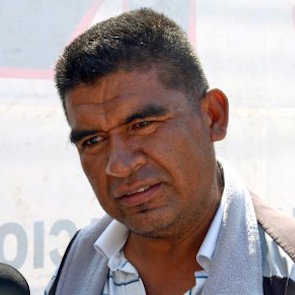Case History: Efrain Picaso Perez
On 30 July 2016, a judge ordered the release of Efraín Picaso Pérez from prison.
On the night between 28 and 29 October, four human rights defenders, Juan Carlos Orozco Matus, Othón Nazariega Segura, Efraín Picaso Pérez and Roberto Abel Jiménez García were detained.
Three of them were also charged with federal crimes, including kidnapping and robbery. If convicted, they face up to 40 years imprisonment.
 Efraín Picaso Pérez is a member of 22nd Section (Sección 22) of the National Union of Education Workers (Sindicato Nacional de Trabajadores de la Educación – SNTE). Sección 22 is a teachers' union that has been active since 1980. The Section has organised several marches and demonstrations in different parts of Mexico in order to protest against the educational reform approved in 2013, on the basis that it had been passed without prior consultation. Sección 22 is also active in support of political prisoners in Mexico, amongst other human rights issues.
Efraín Picaso Pérez is a member of 22nd Section (Sección 22) of the National Union of Education Workers (Sindicato Nacional de Trabajadores de la Educación – SNTE). Sección 22 is a teachers' union that has been active since 1980. The Section has organised several marches and demonstrations in different parts of Mexico in order to protest against the educational reform approved in 2013, on the basis that it had been passed without prior consultation. Sección 22 is also active in support of political prisoners in Mexico, amongst other human rights issues.
On the night between 28 and 29 October 2015, the four human rights defenders were arrested in Oaxaca, Mexico. While police had an arrest warrant, they reportedly refused to show it to the human rights defenders. Jiménez García was detained by plain-clothes armed officers who did not wear any identification number. Picaso Perez was taken while travelling on a private vehicle, which would indicate he was being followed. The four human rights defenders were taken from Oaxaca to Mexico City to be presented before the federal prosecutor (Procuraduría General de la República). All four defenders are being held at the Almoloya Prison, which is a maximum security prison near Mexico City, although their cases are being investigated by federal courts based in Oaxaca.
Following detention, and in violation of the procedure required by law, the human rights defenders were kept without communication with their lawyers and without access to medical health. After a writ of Amparo filed on the 29 October and partially granted, it is expected that the defenders have access to their medication.
However, until the 3rd of November, human rights defender's representatives had not been able to communicate directly with the detained and, from the little information available, they believe the defenders themselves still don't know the charges they are facing. The representatives have also filed a complaint before the National Human Rights Commission (Comisión Nacional de los Derechos Humanos).
The human rights defenders are facing charges of aggravated robbery, riot, damage to property, acts against the national wealth, amongst others, for peaceful demonstrations that took place in July 2014, August 2014 and June 2015 in different locations of Oaxaca state.
In Mexico there has been increased misuse of the penal system in order to criminalise the defence of human rights, especially in the context of social protest. For example, the use of open, vague and ambiguous charges that criminalise and restrict the work of human rights defenders, which include crimes of ‘deprivation of liberty’, ‘attacks on communication networks’, and ‘attacks on national wealth'. Moreover, the indiscriminate use of preventive detention is used in Mexico against people who carry out peaceful activities to defend human rights.
